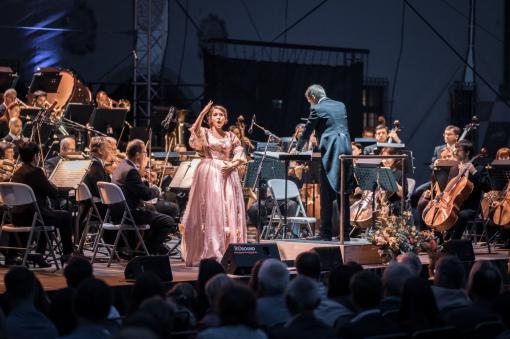For the opening concert of the 20th anniversary season of the Špilberk Festival yesterday, the Brno Philharmonic chose a dramaturgy consisting of proven as well as lesser-known pieces. The subtitle Romantic Carnival immersed all evening in the carnival spirit associated with celebrations before the carnival opening. The aim of the programme was to characterize the period of merriment, celebrations and masks by compositions that tell with their mood about this period of the year. The almost full-up castle courtyard had the opportunity to enjoy an unpretentious and appealing programme, which also with its lower temperature more easily approached that cold carnival period.
A lively opening of the concert was done by the Roman Carnival Overture by Hector Berlioz, which towards the end evolved into celebratory fanfares attracting to the dance by their very nature, however, not with an extent of sensitivity in the play that this composition would have deserved. A poetic stopover, which brought in a magical atmosphere, was The Swan, probably the best known thirteenth part from the cycle Carnival of the Animals by Camille Saint-Saëns, in which the cello player Michal Greco excelled with his precisely rendered solo. Perhaps he was a little harmed only by a not completely ideal sound amplification system, which unfortunately was all the more audible in this solo performance.
It was the sound system in particular that right from the first composition negatively influenced the resulting sound, which, especially in the weaker dynamics of the strings lacked in their typical clarity and sharpness and remained something like suffocated under the acoustic blanket.
Barcarolle from the opera The Tales of Hoffmann by Jacques Offenbach virtually danced through the courtyard in a swinging waltz rhythm. The soloist of the evening, soprano singer Patricia Janečková subsequently introduced herself in the role of Olympia. In the figure of a wind-up doll, performed in a theatrical way (when she needed winding-up again in the middle of the song, the conductor was greatly assisted by the sound of percussion), the singer performed some coloraturas that call for respect given her young age. The same author wrote the notorious Can Can (from the opera Orpheus in the Underworld) that was heard at a brisk pace and with an energetic share of all the members of the orchestra.
In the aria of Giuditta from the operetta of the same name by Franz Lehár, the aforementioned soloist showed her voice potential even better. She topped up her singing with lively and coquettish gestures that artfully portrayed the nature of the aria ('Meine Lippen, sie Küssen so Heiss', translated as 'My Lips Kiss So Hot').
In general, Patricia Janečková, who is only 21 years old, lacked in her singing the proper depth and settlement typical of renowned sopranos, yet her voice clearly possesses an admirable range, supported by constantly refined technique. In some passages, the noticeable rustle and coarseness of this voice can be attributed to the starting career position on which the singer is standing. And all this despite her many years of singing experience on many opera and concert stages where she has appeared since her early childhood.
The Strauss family finished the first half of the evening. The Carnival in Paris by Johann Strauss and the aria of Adele from the operetta Die Fledermouse by Johann Strauss Jr. were performed precisely by the string section.
The second half of the concert was a bit of a puzzle for the audience, as the order of compositions in the printed programme did not match the actual order. The popular overture of the operetta Die Fledermouse was in fact not heard at all by the audience, hence, the second part was purely Czech. It was opened by Bedřich Smetana's Prague Carnival , his last symphonic work, which was no longer given the grandeur that the composer had planned. Smetana's work was also represented by the aria of Vendulka Hlásej ptáčku [The Lark's Song] from the opera The Kiss, in which, due to the Czech libretto, the singer's precise pronunciation was fully expressed.
The most romantic harmonies then shone out from the calm Poem , the most famous part of the orchestral idyll In the Evening by Zdeněk Fibich. The colourful instrumentation highlighted the well-thought-out depth that the late-romantic composer embedded in this piece.
As an imaginary bridge, Fibich interconnected the space between his slightly more prominent colleagues and at the end of the concert gave the floor to Antonín Dvořák. The soloist performed one of the most famous arias in Czech opera literature, Rusalka's desireful song Měsíčku na nebi hlubokém [Song to the Moon]. After some initial uncertain tones, she matched the pace with the conductor's gestures, and sang the aria with a surprisingly full voice, backed up again by excellent pronunciation.
In the end, Dvořák's instrumental Carnival, obviously more lively and enthusiastic than the previous carnival-tuned compositions, took the floor in a striking and vigorous manner. Its soft middle part, on the other hand, allowed the audience to look into the peaceful atmosphere of a forest, in which the composer made the call of a cuckoo in the clarinet part stand out most clearly . The concert ended with the energy-charging theme that had opened it.
Estonian conductor Risto Joost, who appeared for the first time in Brno, was able to impress adequate character and jubilance to his performance and to the Czech compositions, and with his conducting he also supported the usual certainty and coherence of the Philharmonic. This year's festival started pleasantly and we can say that also successfully.
































No comment added yet..